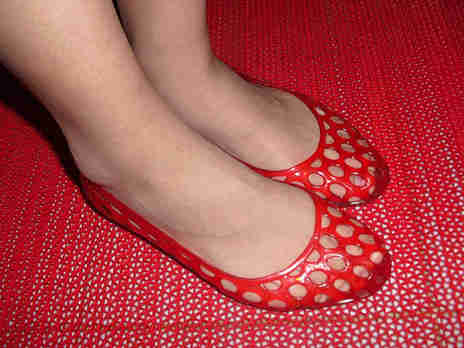這兩年流行的五顏六色的果凍鞋,你穿過嗎?這種鞋因外形可人、方便易穿、價格低廉受到很多年輕消費(fèi)者的喜愛。據(jù)說,果凍鞋早在上世紀(jì)80年代就在國外盛行了。

Jelly shoes or jellies are shoes made of PVC plastic. Jelly shoes come in a large variety of brands and colors and the material is frequently infused with glitter. Its name refers to the semi-transparent materials with a jelly-like sheen. The shoes became a fad in the mid 1980s, when a pair could frequently be purchased for less than one US dollar. Like many other fashion trends from the 1980s, jellies have been revived a number of times since the late 1990s.
果凍鞋(jelly shoes或jellies)是由聚氯乙烯塑料制成的鞋。很多品牌都生產(chǎn)這種果凍鞋,顏色多樣,而且生產(chǎn)時會在材料中添加閃閃的亮片。之所以叫jelly shoes,就是因?yàn)橹圃爝@種鞋的半透明材料會表現(xiàn)出類似果凍那樣的色澤。果凍鞋在二十世紀(jì)八十年代中期曾經(jīng)很流行,一雙鞋售價不到一美元。像其他上世紀(jì)八十年代的時尚潮流一樣,果凍鞋自上世紀(jì)九十年代以來曾經(jīng)數(shù)次回歸時尚前端。
The exact origins of the jelly shoes are unclear. A frequently offered explanation is that they were designed by a shoe maker in France after World War II, when there was a leather shortage in Europe. Another possibility is that the shoes were created somewhere in the late 1950s or early 1960s, when plastic became a commonplace material, and fashion designers began to experiment with it.
關(guān)于果凍鞋的起源,沒有一個明確的說法。經(jīng)常提到的一種說法是,果凍鞋是在二戰(zhàn)后由一位法國的鞋匠設(shè)計(jì)的,當(dāng)時歐洲正經(jīng)歷皮革短缺。另一種說法是,這種鞋大約是在上世紀(jì)五十年代后期或者六十年代早期出現(xiàn)的,當(dāng)時塑料已是常規(guī)材質(zhì),時尚設(shè)計(jì)師就開始試著用塑料做鞋。
相關(guān)閱讀
(中國日報(bào)網(wǎng)英語點(diǎn)津 Helen)
